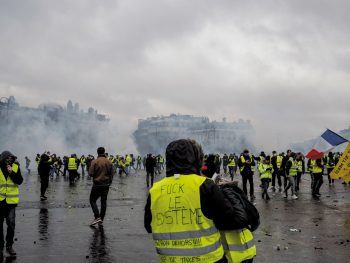James McAuley at the NYRB:

The gilets jaunes are more than a protest. This is a modern-day jacquerie, an emotional wildfire stoked in the provinces and directed against Paris and, most of all, the elite. French history since 1789 can be seen as a sequence of anti-elite movements, yet the gilets jaunes have no real precedent. Unlike the Paris Commune of 1871, this is a proletarian struggle devoid of utopian aspirations. Unlike the Poujadist movement of the mid-1950s—a confederation of shopkeepers likewise opposed to the “Americanization” of a “thieving and inhuman” state and similarly attracted to anti-Semitic conspiracy theories—the gilets jaunes include shopkeepers seemingly content to destroy shop windows. There is an aspect of carnival here: a delight in the subversion of norms, a deliberate embrace of the grotesque.
Many have said that the gilets jaunes are merely another “populist movement,” although the term is now so broad that it is nearly meaningless. Comparisons have been made to the Britain of Brexit, the United States of Donald Trump, and especially the Italy of Cinque Stelle. But the crucial difference is that the gilets jaunes are apolitical, and militantly so.
more here.
